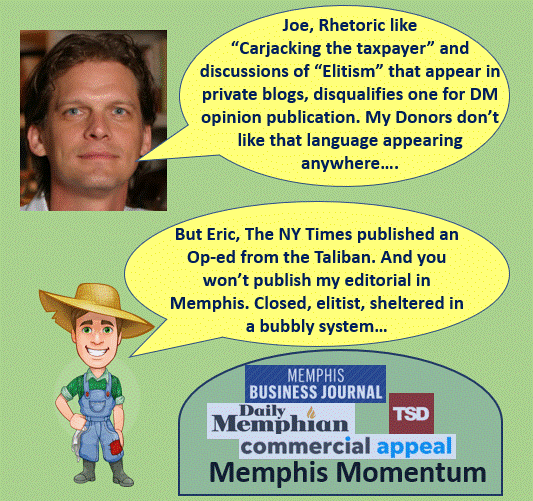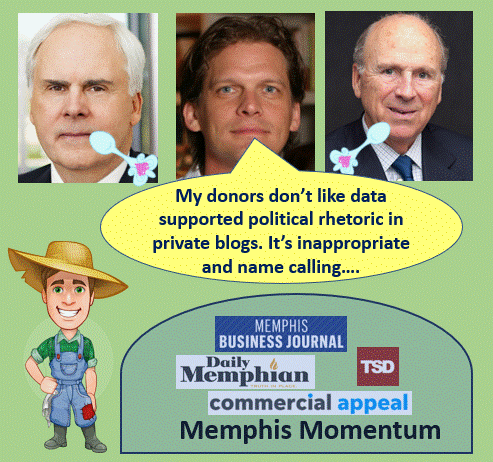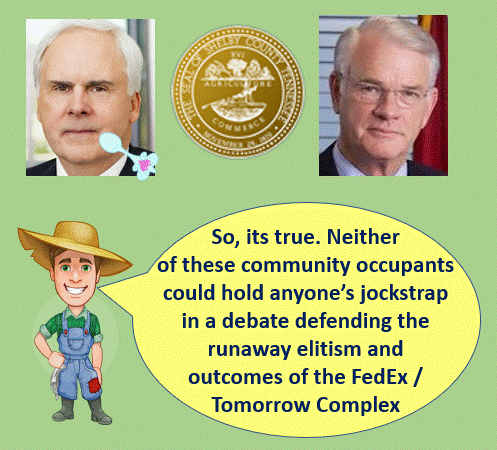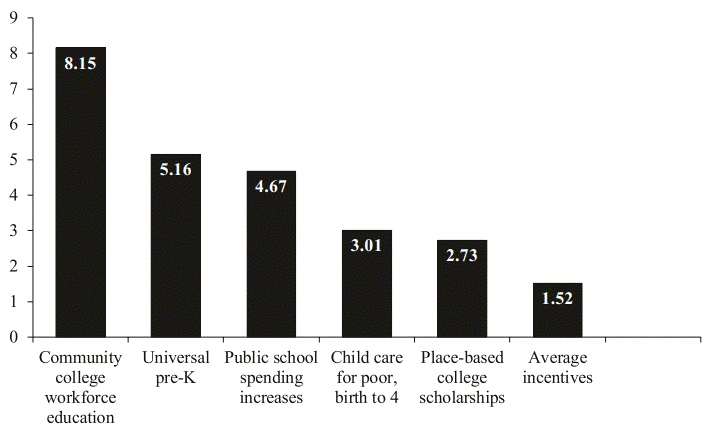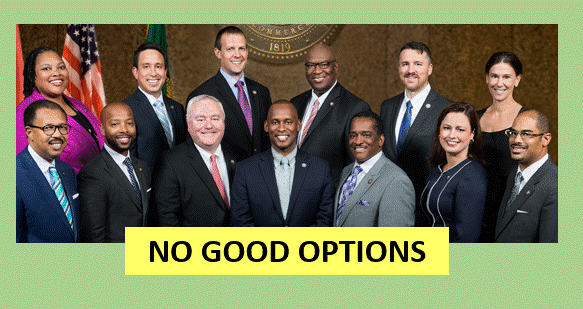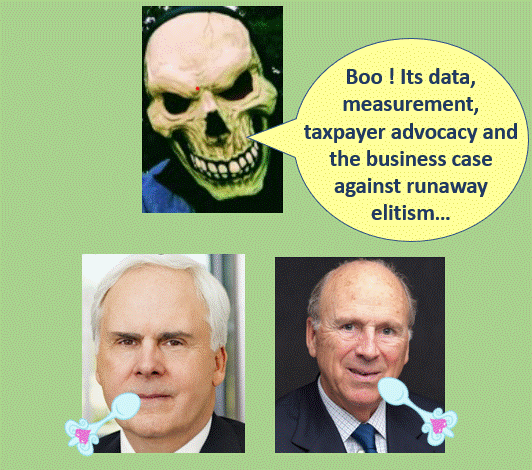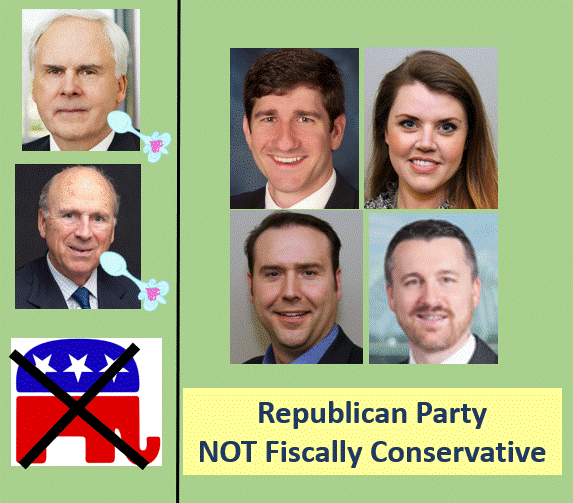C’MON MAN: FedEx Beat Down and Carjack
Everyone’s heard, “Memphis would be nothing without FedEx”. Stated over and over, in various ways, the former becomes a governing belief system that fuels a public beat down and corporate runaway elitism on the back of a Memphis community in need. With documentation, this blog will discuss how a beat down leads to an actual up to $3M FedEx taxpayer “carjack” involving its World Trade Center. It’s a metaphorical carjacking, in the sense, that it is financially what might as well be happening to the taxpayer.
Fred Smith created and administered the growth of FedEx. But the fact is, the Memphis taxpayer built FedEx. This fact is missing from the local discourse. Recently, in a story on Fred Smith, Michael Nelson of the Daily Memphian (DM), reminded locals that Memphis is Shreveport without FedEx – a beat down that paves the way for excessive incentives and runaway corporate elitism. Michael, C’mon Man, the Memphis taxpayer built FedEx !
The local press and university community avoids raising questions of elitist policies. And the Daily Memphian’s, Dr. Otis Sanford who serves as University of Memphis Hardin Chair of Economic Excellence and Managerial Journalism, who one would think would write about such economic subject matter, instead go, focuses on political commentary for the DM.
All the while, corporate elitism remains unquestioned in the local discourse, even though research based documentation reveals $300M+ in excessive local tax incentives. In this way, there is no progressive social justice or fiscal conservatism while leaving corporate elitism locally unchecked.
But the Shelby Count Mayor and County Commissioners are well on their way to the indefensible reappointing of Al Bright as EDGE Board Chair and one of the primary authors of local runaway elitism. And if reappointed, Bight will serve 16 yrs, longer than local officials can serve. Mayor and County Commission, C’mon Man !
The Carjack
So how does this metaphorical FedEx WTC carjack occur? Well like any other carjack occurs, with a beat down vulnerable target and an unlocked door or window as an access point. In this case, the public sector is beat down believing they are nothing without FedEx. Then their is ambiguous PILOT contract language as the access point.
This email chain, obtained from the County, reveals the ambiguous contract language of “substantial completion” as the access point for the FedEx WTC PILOT extension. It’s virtually impossible to verify or define “substantial completion” 20 years ago. But one can verify that more than 50% of the value of real property building permits were pulled 1 year prior to the FedEx WTC PILOT start date of 12/31/97 for a 20 year PILOT that was originally scheduled to expire on 12/31/17.
If the public sector were not vulnerable and beat down, the answer to FedEx is: “FedEx, we appreciate your business but we can’t do that at this time based on our records that indicate there was substantial completion at the time the PILOT started on 12/31/97. With that stated, we are happy to begin your new 75% tax abatement that will expire in 2032. This will, in effect, give you a 35 year 82% tax abatement.”
But that is not what happened with an overall 82% 35 year PILOT not good enough for FedEx. FedEx wanted to stay on their old 100% PILOT and not go on the new 75% PILOT that was approved in 2016. Here is what happened:
In 2017, FedEx initiates contact with the Collierville Industrial Development Board attorney and requests an extension to the 100% PILOT based on ambiguous “substantial completion” contract language.
Collierville IDB contacts Shelby County Assessors office and without negotiation, the Assessor’s office agrees to the extension without Collierville IDB public meeting approval.
In 2019, there must have been some type of lapse in implementation, where similar emails were sent, with this time, an attorney intervening notifying the Shelby County Trustee’s office of the PILOT extension.
Using values contained in the email chain, the total carjack potential cost of the original PILOT extension to Shelby County taxpayers is $3.3M. See below table.
Hey FedEx, even with high property tax rates, Memphis is a nationally low business cost operation center. C’mon Man !
Conclusion
There is no progressive social justice or fiscal conservatism while rewarding and allowing a rigged system and runaway elitism to persist. Historical and research based root cause analysis reveals that flat property tax revenues exist due to excessive corporate/real estate incentives.
Blame should be assessed to the political advocates of such elitist policy while rewarding the public with greater political access, genuine social justice and fiscal conservatism as expressed through rigorous oversight and taxpayer advocacy.
Besides, the FedEx/Memphis Tomorrow complex already owes the taxpayer $1.5B. Don’t listen to them or the donor driven Daily Memphian.
And C’mon Man ! Memphis remember, you built FedEx……
FEDEX CITY/COUNTY ANNUAL ABATED OR EXEMPT TAXES
Below are the properties for which FedEx gets City and County tax exemptions or abatements which amount up to approximately $14M per year. The exempt property list was obtained through a Shelby County Assessor public information request. If there are any disputes with the below calculations, please email me at jkent@pathtrek.net.
THE LOCAL PRESS AND ELITISM: Just Say No To Taxpayer Advocacy…
In the face of runaway elitism, data supported political rhetoric is not allowed in the Memphis public discourse. In fact, mere press reporting that would point readers to the existence of excessive corporate/real estate incentives, for the benefit of the small few, seems locally disallowed.
While the Commercial Appeal and Tri-State Defender have allowed me to publish editorials on excessive incentives, their own writers have yet to persist in calling out excessive corporate/real estate incentives. And Eric Barnes, of the Daily Memphian, won’t even consider a data supported editorial, from me as a local blogger, that proves the existence of excessive incentives. Barnes rejects editorial submissions, without reading them, on the basis of “name calling” that appears in private blogs.
The former keeps Memphis in a bubble resulting in an ignorant educated electorate, while sheltering runaway elitism that occurs on the back of a community in need. Barnes would perhaps prefer dissenting opinion on economic development to say, “misdirected” or something like that. But its much more than just “misdirected”.
If one just progresses through the known facts of bogus accounting by EDGE to justify excessive incentives over 8 years ,which has been published by both reputable local and statewide sources and then couple that with the lack of legislative oversight, one logically arrives at “systemic” and “intentional” excessive incentives persisting on the back of a community in need. Rhetorically, there is no other way to describe this other than “carjacking the taxpayer” and”hack elitism”.
After 8 years of excessive incentives, such provoking rhetoric should be expected in the public discourse through the fundamental practice of taxpayer advocacy where incentives can be shown to be $300M+ in excess. Instead, taxpayer advocacy and discussions of “elitism” seem crowded out in the public discourse with instead persistent discussions of “racism”. Basic taxpayer advocacy is blaspheme!
The overamplification of racism can have the effect of dividing middle class taxpayers along racial lines while elitism persists. After all, elitist policies are systematically being carried out and protected by a highly diverse public-private complex. This blog believes that social justice starts with taxpayer justice which has been sacrificed by a non-reporting press, lacking university thought leadership and legislative oversight.
Nonreporting Press
Otis Stanford, who writes opinion for The Daily Memphian (DM), also serves as the University of Memphis (UofM) Hardin Chair of Excellence in Economic and Managerial Journalism. The tentacles of the local press extend into the university community with also Michael Nelson, a Daily Memphian columnist, on staff at Rhodes.
I don’t recall, mostly political journalist Sanford, ever using his DM platform to write about economic development other than cheering on the excessive incentives of the Union Row project. So much for Jabie Hardin’s, who I knew, contribution and Chair of Economic Excellence. And Nelson recently wrote, in an article about Fred Smith referencing another’s remarks “Memphis without FedEx is Shreveport”. This excerpt arguably helps to further the local subservient mentality.
This local press’ extension into the university community makes one wonder, what is the next generation of journalist being taught? To not report and investigate ? The investigative journalism partnership between the Daily Memphian and The University of Memphis just seems to have never got off the ground. I once met with Marc Perrusquia, who is over the UofM investigative journalism partnership. Perrusquia seemed interested in my economic data for a potential investigative report but that story seems to have been squashed somewhere in the system.
But just for a moment, forget about investigative journalism. How about just basic reporting from the traditional media that would reveal excessive economic development incentives ? After the recent excessive UPS award for $38M, for a mere 25 jobs and $260M in capital investment, all a local reporter has to do is google to find the recent UPS incentive awards for Atlanta and Louisville.
Atlanta awarded $27M in incentives for 250 jobs and a $461M capital investment and Louisville awarded $40M for 1,000 jobs and a $750M capital investment prior to the Memphis UPS award. At the time of the Memphis award, it was clear that UPS was making geographic investments with arguably nowhere else to go other than Memphis but was locally awarded $38M in incentives for only 25 local jobs.
While considering the higher tax rate, the EDGE Board in one meeting, left at least $20M+ of the $38M on the table in excess. But no local comparative press reporting occurred. The socially driven local establishment hates comparative data on incentives, so the local press avoids its reporting, leaving the taxpayer ignorant and holding the bag.
Or then again the local press could just pull the State of TN Comptrollers report and find that Shelby County has 431 parcels under PILOT contract while Nashville-Davidson has 25, Chattanooga-Hamilton 38 and Knox County 52. This would be strong evidence for the existence of excessive tax incentives. But the press won’t report it. Nor will Otis Sanford, Daily Memphian columnist and UofM Hardin Chair of Excellence in Economic and Managerial Journalism, opine about the report in the Daily Memphian.
Or the local press could have critically written about a $3M grant to the UofM for a $19M tennis center without hearing competitive proposals or considering any economic impact justification. And then there was the recent $3.3M Shelby County grant to Memphis River Parks Partnership that contained no taxpayer deliverables or time frames which the local press chose not to question.
And last but not least, the local press could critically write about Memphis Tomorrow. But no one does while normalizing decline.
Conclusion
Its much more about pageantry and symbolism in Memphis than progress. Taking down the statues took center stage and that works as the best argument for taking down the statues that I have read in effect states that there was momentum for taking the statues down, people wanted them down, they needed to come down and they came down. That works for the community as a whole !
But economic development substance is lacking in Memphis. It must be stated that Andrew Young, one of the primary early architects of the explosive growth of Atlanta, blew off spending time on taking down statues calling it symbols over substance. So Young and his peers focused on substance and Atlanta grew.
Meanwhile, in Memphis, overamplification of racism crowds out basic taxpayer advocacy in the news cycle while potentially dividing common folk as runaway elitism persists. I say elitism after witnessing a highly diverse public-private complex defecating on a Memphis community in need through unmeasured and botched taxpayer funded initiatives and excessive corporate/real estate incentives for the benefit of the small few. Memphis does not seem to know how to grow while only knowing how to feed on its own people in a community in need.
And I can’t say it enough., the FedEx/Memphis Tomorrow public-private complex is below average and down in all categories, over almost 20 yrs, while their initiatives use your federal, state and local tax dollars. The accumulated debt to the community is $100B in GDP shortfalls, $50B in wages and $1.5B to taxpayers.
In the end the Memphis public-private complex follows the elitist corporate socialists in Pitt Hyde and Fred Smith. But just sayin, elitism is the parent of racism and deserves more attention in the public discourse along with basic taxpayer advocacy….
CARJACKING THE TAXPAYER – FedEx World Trade Center
Carjacking the taxpayer, by the small few, is the currency of decline in Memphis. In fact, some dismiss this claim, labeling it personal attacks or name calling. And they are correct, it is personal attacks based on the data supported facts of normalized decline, carjacking the taxpayer, violating and feeding on a Memphis community in need. Much of the carjacking is done under the heading of “government efficiency”. But there is nothing that is as inefficient and nationally embarrassing as the FedEx/Memphis Tomorrow public-private complex.
Carjacking the taxpayer comes in the form of excessive incentives and an unmeasured FedEx/Memphis Tomorrow complex that is down in all categories over almost 20 years using your federal, state and local tax dollars. Runaway elitism, fueled in large part by poverty, is not offensive to an archaic and nationally embarrassing leadership complex that has racked up an estimated $100B in below average GDP growth, $50B in deficient wealth creation and $1.5B in taxpayer shortfalls.
Fred Smith or former Mayor Mark Luttrell could not hold anyone’s jockstrap in a debate defending the runaway elitism and outcomes of the FedEx/Memphis Tomorrow complex.
History says, the FedEx/Memphis Tomorrow Complex has failed….
So who do elitists turn to when they want to carjack the taxpayer? None would be better than former lawman and Mayor Mark Luttrell. When they needed someone to botch the workforce development system and stifle small business, they turned to Mark Luttrell. I know. I made a formal professional complaint to Mayor Luttrell’s office as connected workforce development efforts were seriously behind schedule at the time in 2016. Luttrell turned around and carjacked the taxpayer and stifled local small business leaving the workforce development system in an indefensible mess when he left office costing taxpayers an estimated and now recurring $15M per year.
When the elitist wanted to implement systemic and fiscally liberal corporate socialism, in the form of EDGE, they turned to lawman Mark Luttrell to carjack the taxpayer. And when FedEx wanted to carjack the taxpayer with a new PILOT for the FedEx World Trade Center (WTC), they turned to lawman Mark Luttrell. But what’s even more alarming about the new FedEx WTC PILOT, FedEx did not even want to abide by the new PILOT and pay the 25% PILOT based on an examination of public records.
FedEx World Trade Center (WTC) PILOT
The fiscally liberal FedEx WTC PILOT approval led by lawman Mark Luttrell, came on the heels of a 20 year 100% PILOT valued roughly at $70M+. The excessive new 75% PILOT is valued at $64M over 15 years. And that is on top of FedEx’s other PILOT $34M Downtown PILOT. Can anyone say “Runaway Elitism” ? How about “Corporate Socialism”? You can’t talk in those terms in Memphis.
But here is what is worse. After receiving all of this tax break consideration in the already nationally low business cost operation center of Memphis, FedEx did not even abide by the new 75% abatement PILOT. They wanted to stay on the old PILOT with a 100% abatement.
Somehow, after the Collierville IDB approval of the new 75% PILOT abatement in 2016, FedEx was granted an extension of the old 100% PILOT abatement without Collierville IDB approval, resulting in an annual County taxpayer loss of $750K per year or about $1.5M over the extension term. This can found by examining the dates contained in the 2017 Shelby County Trustee and 2018 Trustee reports for properties located at 60 Bailey Station and 0 FedEx.
The additional challenge of this information, is it is published and questioned nowhere. Its not part of the public discourse, as flat property tax revenues are discussed amidst a range of community challenges. There is not a consolidated incentive database that would let taxpayers and policymakers know how much corporations and/or real estate owners are getting in total local tax consideration.
FedEx total tax consideration can only be found by making a series of public information requests from the Assessor and the Collierville Industrial Development Board and examining documentation by multiple tax abating agencies in EDGE and Downtown Memphis Commission. (As a note, John Duncan of the Collierville IDB was helpful and expeditious in servicing my public information request)
Further, there is no investigative press with the press either owned by or seemingly taking cues from the corporate elitists within a community without public university thought leadership that questions runaway elitism. Poverty is well documented by Elena Delavega’s Poverty Fact Sheet. But under the FedEx/Memphis Tomorrow Board of Trustees, UofM public university thought leadership on economic development policy that confronts runaway elitism is non-existent.
Heck the University of Memphis itself is busy getting local tax consideration under its FedEx/Memphis Tomorrow Board of Trustees while its Memphis Economy project, partnered with EDGE, leaves the economic development complex wholly unmeasured.
Conclusion
Memphis lacks informed taxpayer advocacy in the public discourse. The elitist effectively disembowel the practice of taxpayer advocacy through a rigged system. Without public university thought leadership, aggressive public oversight, public measurement and non-investigative press led, in part, by editors like Eric Barnes of the establishment owned Daily Memphian, Memphis remains sheltered.
Barnes rejects editorial submissions, without reading them, while calling citizen taxpayer advocacy in private blogs as name calling. And for that matter, it is name calling in calling out the offensive, normalized and destructive practice of unbridled and unchecked runaway elitism that violates and feeds on a Memphis community in need. In the real world, outside of Memphis, the former is nothing more than the basic practice of taxpayer advocacy.
Memphis is brainwashed and beat down believing that they would be nothing without FedEx. But FedEx would be nothing without Memphis. That is food for thought. Meanwhile, the Memphis taxpayer is carjacked, falls behind in the global economy with excessive incentives and high poverty levels while Barnes and publications like the Daily Memphian remain unoffended and offended at the calling out of the authors of runaway elitism.
As far as my personal financial and small business mugging by Fred Smith, Mark Luttrell and Pitt Hyde, they feel entitled to financially mug local residents and small business within the public-private complex, while implementing systemic decline and ripping off local small business ideas, only to see them shipped off to Canada and Boston. Then, with their finger strategically placed, they wonder why small business struggles in Memphis.
Meanwhile, as you are getting financially mugged, you turn around and figuratively bust them in the mouth where this is locally termed, “inappropriate and politically incorrect”. Smith and Hyde would be bankrupt over and over if they just paid 1/2 the debt they owed Memphis. And allowing them to continually carjack the taxpayer only makes the debt worse on a debt they could never repay. Smith, Hyde and Luttrell are in effect taxpayer carjackers. And History Says, They Suck !
PS. My rejected Daily Memphian submission was data supported, professionally written without so called name calling and can be accessed here.
RENEGOTIATING ECONOMIC DEVELOPMENT: Using a Research Based Approach to Support Workforce Development
Memphis is not investing in its workforce. This was stated last week in a meeting of workforce practitioners. For years, Memphis has been transferring wealth, under the heading of “economic development” to real estate developers and corporations to serve global audiences. At the same time, by design, Memphis falls behind in the global economy while dismissing a major economic development asset – its youthful population.
Last week, in Commission Chambers, I asked if Memphis Tomorrow, Republicans or Democrats had any research to support that excessive tax incentives actually work. There were no answers and the data shows they don’t work. So how might local legislators renegotiate economic development more around workforce development ? The simple answer is by using research.
First, it has to be determined that excessive incentives is a budget committee issue. And to renegotiate economic development in favor of workforce, budget chairs will need the support of those committee chairs that are over youth and workforce development.
While connecting the workforce, youth and workforce development chairs would be advocating for economic development funding for programs like the Southwest CC Foundation, 9-12 Early Postsecondary Opportunities (EPSOs), Memphis Office of Youth Services, Junior Achievement and professional development. Legislators would further call for major private sector assistance to help Memphis catch up in the global economy while renegotiating economic development funding.
Renegotiating Using a Research Base
Next, in this sample renegotiation, Dr. Timothy Bartik’s research Making Sense of Incentives will be used. The research is designed specifically for policymakers. In his research, Bartik states that less than 25% of economic impact is derived from incentives. The 25% is referred to as the “but for” percentage meaning that less than 25% of the time but for the incentive the economic expansion would not take place.
In his economic modeling, Bartik uses a 12% “but for” percentage. Local policymakers should do the same in their renegotiation of incentives. To that extent, customized for Memphis conditions, we can model a sample renegotiation of Memphis/Shelby tax incentive policy.
Commissioner and Councilman Jones and Jones, using a research base, would like Bartik, start the negotiation at 12%. Then corporate/real estate incentive advocates would push back and claim Memphis needs greater incentives due to high crime, workforce challenges and a high property tax rate.
Jones and Jones would recognize these Memphis challenges while stating that Memphis has a low business cost operating environment negating the high property tax rate claim while adding 5% for each high crime and challenging workforce which actually needs more funding. Legislative workforce advocates would lend their support to the Budget Chairs. And a “but for” of roughly 25% would be derived for the average incentive.
In this way, we can apply the adjusted “but for” percentage and recalculate EDGE’s economic impact from their EDGE SCORECARD down from $1.4B to $356M. This recalculation would show EDGE operating at a total projected taxpayer loss of $236M. So over a 10 year span, there is a $24M per year in excess going to corporate/real estate incentives and not to workforce for years to come and where advocates for a better workforce should be up in arms. With flat property tax revenues, service gaps in public transit and workforce challenges, the recalculation makes sense of the current environment.
At any rate, in this modeling, the 25% is the average “but for” percentage. To get to a sensible implementation of economic development policy to arrive at an average “but for” of 25%, low wage warehousing jobs and existing companies would have a “but for” percentage much less than 25% while companies relocating to Memphis in target industries would have a “but for” higher than 25% in calculating and sizing incentives.
Making the Economic Development Case in Favor of Workforce
Bartik’s research has gifted advocates of workforce development with a research based tool to make the case for workforce within the context of economic development. The chart below, from Bartik’s research, shows the economic impact of investing in workforce compared to incentives.
For example investments in Southwest Foundation would garner a 8.15 taxpayer benefit to cost ratio compared to 1.52 for incentives. And investments in EPSOs, which is a K-12/Post Secondary investment, can be calculated using the below chart, to have a 6 taxpayer benefit to cost ratio compared to 1.52 for the average incentive.
In the current environment, Memphis workforce development practitioners, should feel confident in making the research based business case for workforce development public and private sector funding within the context of economic development.
Conclusion
With flat property tax revenues draining off needed public funding for workforce development, the data is clear, sufficient economic development investments are not being made in workforce.
Excessive corporate/real estate incentives and unmeasured public-private initiatives are keeping Memphis behind in the global economy. Based on available benchmarking data, Memphis incentives are even excessive even compared to the environment that Bartik is questioning in his research.
Renegotiating economic development with corresponding major infusions by the private sector in workforce is the only path to competitive growth while helping Memphis catch up in the global economy.
About Bartik’s Research
Dr. Timothy Bartik’s Making Sense of Incentives research that centers on state incentives, is designed for policymakers and specifically mentions local legislative bodies. While there are a number of ways to evaluate incentives, Bartik’s work provides just another research based methodology to evaluate incentives.
MATA FUNDING: Elitist Formula and Research Based Solution
The corporate elitist formula is on full display for taxpayers. That formula is to bully taxpayers into a corner, with no good options but to fund a public service that the community needs and the corporate elitists massively consume – public transit. Not funding transit through an increased $20 fee/tax actually makes life worse for Shelby Countians, especially it’s most vulnerable.
The revenue shortfall to fund public transit stems from excessive corporate/real estate incentives and a botched workforce development system over a number or years administered by the Memphis Tomorrow public-private complex. As a result, when coupled with slow growth, Memphis/Shelby taxpayer revenue shortfalls exceed $50M per year.
The challenge for local legislators is that they need new revenue now. And the only way to get new revenue now is to tax the general population. Revenue shortfalls to support growth, which includes, in part, funding for public transit, are already scheduled and baked into future budgets with previously approved excessive corporate/real estate incentives for years to come.
And while yes, some savings can be had here and there, maybe like $500k-$1M from the community enhancement program, massive revenue shortfalls to fund scheduled business growth still remain from the formula product of runaway corporate elitism. So the public and legislators are backed into a corner with the $20 fee as the least bad option. But there are research based solutions to limit future revenue shortfalls that come in the form of true economic development for all.
Solution: Bartik’s Research
In the current environment and with no economic development plan, Dr. Timothy Bartik’s Making Sense of Incentives research should be required reading for local legislators. Bartik’s work was provided to me by Charles Gascon of the St. Louis Federal Reserve. After all, there is nothing research based about bully corporate runaway elitism.
To that extent, like this blog, while not being opposed to the use of tax incentives, Bartik documents a number of leakages in common tax incentive modeling. Bartik further makes clear that economic modeling assumptions are critical in effectively understanding economic and fiscal impact. In his research, that focuses primarily on state incentives, Bartik communicates the following benefit cost ratios for economic development:
Public transit was not part of Bartik’s consideration in this case above but would certainly be part of overall economic development efforts in helping the most vulnerable get to work. But, while leveraging his research, in a City Lab interview on incentives and specifically in regard to the Amazon HQ2 package, Bartik says about the winning Virginia incentive package that was not the most lucrative:
“In Virginia’s case, a lot of the “incentives” were public-service enhancements: a new campus of Virginia Tech in Northern Virginia, improvements in public transit, enhancements in job skills. This kind of package makes more sense than just throwing a lot of cash at the company.”
The currently proposed tax incentive fiscal note impact (TIFNI) platform fully leverages Bartik’s research based approach to sizing tax incentives. TIFNI accommodates assumption modeling and opportunity costs into its calculations. There are research based approaches to economic development but runaway elitism is not one of them.
Legislators should consider this reality moving forward, while knowing that even within the tax incentive environment Bartik aggressively questions, that Memphis/Shelby tax incentives are still $250-400M excessive when benchmarked against other cities.
Conclusion
Memphians should know that runaway elitism has been culturally normed. After all, there are a vast number of local leaders that stand by while the workforce development system is botched, cheer on excessive corporate/real estate incentives and turn around and pray for Memphis.
While becoming aware of culturally normed runaway elitism and bullied into a corner, with no good options, legislators and the public need to bite the bullet on the $20 fee while moving forward with measurable research based economic development efforts. These efforts include massive incentive reform while confronting runaway elitism.
With major employers either tax exempt or getting 75% abatements, there is no money for community evolution. The LOSB and TIFNI research based economic development solution is ready to go and will help confront runaway elitism of the type that requires persistent tax increases while amplifying community imbalances. Implementation of TIFNI will help avoid future revenue shortfalls.
With no good options, legislators should rest easy voting for the $20 fee while coming back and confronting the fiscal liberalism of the corporate socialists through aggressive economic development reform. In this way, legislators address both short term and long term community needs for years to come….
Boo !
Change It !
FISCAL CONSERVATISM: Really Republicans ? / Morrison Leads
The Republican Party likes to “smoke their own dope” when talking “fiscal conservatism”. Showing up to oppose a $20 fee to help the poor get a lift to work, while ignoring fiscally liberal runaway elitism, is hardly fiscally conservative. Maybe, Republicans need to check their own house.
In their defense., perhaps its because of Republicans’ own ignorance that stems from a non-investigative local press that fails to communicate the fiscal realities of local affairs. And the reality is no city in America can support growth or even the status quo with major employers either property tax exempt or getting a 75% abatement. Its math.
Memphians, in many cases, unknowingly live in a community of runaway elitism administered by the FedEx/Memphis Tomorrow complex of Fred Smith and Pitt Hyde where excessive tax incentives roar for the small few – while Memphis Tomorrow public/private initiatives are down in all categories while using your federal, state and local tax dollars. Its a design for decline occurring without public measurement of the public/private complex.
Its been going on for almost 20 years while racking up below average GDP growth that has cost taxpayers $1.5 billion over time and deficient recurring annual tax revenue totaling $200M. Deficient revenue growth shows up as services gaps in for example public transit as well as others. And local Republicans participate in the wreckage.
Cary Vaughn has sat on two local workforce development boards that have failed to connect workforce development programming costing taxpayers an estimated $15M per year. These botched workforce development efforts have put Memphis 5 years behind in workforce development in a global economy. With no sense of urgency, Vaughn’s mistake was not leading, breaking from his board and going public to confront deficient public-private board leadership on workforce matters.
And Vaughn also sits on the EDGE Board where he just voted for the excessive $38M tax incentive for UPS that was going to happen nowhere else but Memphis as well as the recent LeSaint Logistics PILOT that abated $4.5M in existing taxes for 52 low wage warehouse jobs. To give Republicans some idea of EDGE’s recklessness, consider the below EDGE approvals:
EDGE job incentives at $500 million + exceed the $335 million in total job incentives in both Indianapolis and Nashville combined.
Three of 96 EDGE tax incentive awards — involving International Paper, Nike and Technicolor at $148 million — exceed all of Indianapolis job incentives awards at $135 million involving 110 projects while Indy has greater job growth
In short, EDGE job tax incentives are $250 million+ in excess when benchmarked against other cities. This has resulted in slow growth and lack of available public transit, public safety and workforce development resources.
Further, involving all 13 Shelby County abating agencies, Memphis has 431 PILOT parcel contracts compared to 50 or less for each Nashville, Knoxville and Chattanooga. While these excessive incentives occur, in Commission EDGE oversight proceedings, Commissioner Mick Wright has yet to protest the associated fiscal liberalism as practiced through excessive incentive awards.
It would certainly be nice to see the Shelby County Republican Party show up in legislative chambers to raise concerns against excessive corporate/real estate incentives or $3.3M Riverfront grants that contain no schedule of deliverables or a $3M UofM tennis center grant without economic impact justification or competing proposals.
But apparently blind to runaway elitism, perhaps because they know nothing else, Republicans show up to claim the “fiscal conservative” mantel to oppose a $20 annual fee to help the poor get a lift to work. Meanwhile Commissioner Brandon Morrison leads.
With No Good Options, Morrison Leads
With no good funding options, Morrison leads. I believe she has done thorough research and found that there is no other option available for a dedicated transit funding source. I know she is capable of thorough financial research. And the transit funding dilemma is not new, dating back 3 years when funding was identifed as the primary obstacle to adequate public transit. As a result, again, Memphis falls 3 yrs behind.
Morrison appealed to her own Republican Party, was rejected and led forward. The $20 fee is the best bad option while supporting advocated business and economic development interests. In committee, Morrison effectively said the ad hoc committee is kicking the can down the road, predicting a version of the fee as the final outcome. She has done her homework.
To that extent, I hope the Commission quickly passes a $14 or $20 transit fee while expeditiously moving to reform excessive incentives and implementing publicly administered measurement of the vast nonprofit public-private complex. That is where the greatest cost to taxpayers resides in excessive incentives and under performing public – private initatives.
The proposed tax incentive fiscal note impact (TIFNI) platform provides a fiscal note for every abatement while providing a measurement platform for public-private initiatives. Through the use of a fiscal note, TIFNI helps to right size and reform tax incentives.
Conclusion
Now Republicans know; a $20 fee is nothing in the overall scheme of things. A city cannot be adequately supported while major employers are either tax exempt or getting 75% abatements. And a city can only decline when the FedEx/Memphis Tomorrow complex is down in all categories while using your federal, state and local tax dollars.
Its ok to call it a tax. The poor are already being unfairly taxed with inadequate transit. A $20 annual tax on the rest of us, is not much to ask.
And finally, maybe Commissioners should consider the community debt and ethical invoice to the FedEx/Memphis Tomorrow complex of $1,500,000,000 payable upfront in the wake of 20 yrs of runaway elitism.

